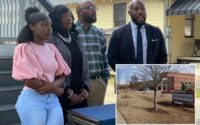Voice of daughter saved wounded Fox News reporter Benjamin Hall
As an unflinching war correspondent, Benjamin Hall covered conflicts in Syria, Iraq and Afghanistan prior to arriving in Ukraine, where his worst nightmare transpired: He became the story.
The 40-year-old was on assignment for Fox News in March 2022, covering Russia’s invasion of Ukraine.
He was traveling in a car with Fox News cameraman Pierre Zakrzewski, 55, and Ukrainian fixer Oleksandra “Sasha” Kuvshynova, 24, through the abandoned village of Horenka when an explosion rocked a patch of pine and birch trees some 20 feet away.
“We’d barely turned to look before the second bomb whistled overhead and landed right next to us and everything went dark,” Hall writes in his new memoir, “Saved: A War Reporter’s Mission to Make It Home,” out Tuesday.
Catastrophically wounded, Hall — who had volunteered a month earlier to cover the crisis, a year after deciding to pull back from the front lines for the sake of his growing family — felt himself slipping into a “deep, infinite blackness.”
“I was blacked out and I had taken a lot of injuries from the second shell,” he told The Post.

But then he heard a familiar voice imploring him to get out of the car.
“I saw my daughters,” he said of 7-year-old Honor, 5-year-old Iris and 3-year-old Hero. “My daughter Honor in particular came to me. And I could see her and feel her. She told me, ‘Daddy, you have to get out of the car.’”
Hall understood he had to move immediately.
“Suddenly I had awareness: I was in the back of a car,” Hall writes. “I felt like I was stuck. The world rushed back into me — light, sound, smell. The car door to my right was open, and Pierre wasn’t there. He must have gotten out. Now it was my turn …

“I turned my head and tried to move, tried desperately to find the key to moving … I got my head out of the car first, through the open door, and then somehow the rest of me, and I stumbled forward.”
And then: Boom. A third explosion.
“I was on fire. Instinctively, I started rolling my body and patting my legs to smother the flames … I saw that my right leg was gone, just some flesh and bone hanging by a flap of skin, and half a foot dangling there,” he writes. “I felt compelled to take a photo of my legs. The journalist in me, perhaps. But when I took it, I realized I didn’t want [my wife] Alicia and the children to ever see it, and I deleted it.”
Hall isn’t sure if he had a “near death experience,” but firmly believes the otherworldly visit from his daughter saved his life on March 14, 2022.

“I was sitting in the middle seat of that little car — the death seat — and somehow, you know, this brought me back and got me out of the car and saved my life,” Hall said of his daughter’s voice. “I honestly think that I was saved that day.”
In addition to his blown-up legs and injured hands, matchbox-size shrapnel from the blasts had lodged in his eye and neck.
And yet, he managed to flag down a car, even as his cameraman, Zakrzewski — injured and on the ground a few feet away — said in fear, “They are Russians.”
Those would be the last words Hall heard from his friend, who passed away minutes later. Kuvshynova also lost her life.

In fact, Hall’s rescuers were Ukrainian special forces agents, who helped him get to a hospital. He was soon evacuated to Germany and later transferred to Brooke Army Medical Center in Texas, where doctors performed several of roughly 30 surgeries Hall has endured since the fateful attack — with even more to come.
The staggering extent of Hall’s injuries led surgeons to amputate his right leg below the knee, as well as his left foot.
He also needed reconstructive surgery on his left hand and now has no sight in his left eye, which Hall may eventually lose due to shrapnel that tore out his iris, lens and cornea.
“And I saw my daughters, my daughter Honor in particular came to me. And I could see her and feel her. She told me, ‘Daddy, you have to get out of the car.’”
Benjamin Hall
Still, the foreign correspondent, who was based in Washington, DC, at the time, never lost hope that his best days are yet to come.
Hall, who joined Fox News in 2015, returned to the network for the first time in January, telling viewers he felt stronger and “more confident” than ever despite his long rehabilitation ahead.
That momentum continues to grow, he said.

“It’s been a whole year of recovery,” Hall said. “And really, what I wanted to do is talk to people and tell the story and hopefully spread some positive hope at the same time.”
The process of writing his memoir — which will be released on the anniversary of the deadly attack — proved incredibly “cathartic,” he added
He’s continuing to recover in his native London with help from his wife, Australian businesswoman Alicia.
Fox will air a documentary on his story, “Sacrifice and Survival: A Story from the Front Line,” at 9 p.m. Sunday, March 19.
He also shares his progress on Instagram to more than 24,000 followers.
Hall’s most recent post urges visitors to “aim to get a little better every day,” complete with a poignant montage spanning his recovery, from the blast aftermath to swinging clubs at a golf range.
“One of the things I really learned through this whole process is you have to look at things head on,” Hall said of sharing his healing on a public stage. “You have to address them, you have to think about them. You’ve got to think about all angles of them. If you don’t, that’s when they might come up and really catch you by surprise.”

Hall said he spends a lot of time thinking about Zakrzewski, who was his partner on dozens of overseas assignments. He considered the Irish-born cameraman to be a teacher above all else.
“Pierre was amazed by just how loving and generous people could be,” he writes. “To him the world was far [more] wonderful than it was frightening.”
The book details many of Hall’s dangerous and far-flung assignments, for outlets including the BBC and the Times of London, over the years.

He also recalls that in August 2017, he and Zakrzewski connected on a personal level as they worked in Barcelona, when Islamic State terrorists drove a van through a busy tourist thoroughfare, killing 13 people.
Hall — whose father passed away just weeks before the correspondent traveled to Ukraine — was heavily feeling the recent death of his mother and the birth of his second daughter.
“To suddenly be reporting on the tragic deaths of so many innocent people — when I was already contemplating questions of life and birth and death — was emotionally wrenching,” he writes. “In our downtime [Pierre] sat with me for long talks about just these weighty matters.”

The two also bonded early on while in Ukraine, reporting from a children’s hospital where all but two kids had been evacuated. One was a baby born to a Ukrainian surrogate; he needed a bowel operation and his British parents refused to have anything to do with him now. The staff called him Prince Charlie because of his heritage.
“And so the baby was there, abandoned to the chaos of war, alone in the dark,” Hall writes.
Both Hall and Zakrzewski were shaken to the core over the plight of this helpless child and wanted to help.

“Maybe I will even adopt him,” Zakrzewski said.
Now, Hall said, his intention is to honor Zakrzewski, Kuvshynova, baby Charlie and countless other victims across Ukraine with his account.
He wants to transform trauma into inspiration — a lesson he learned from the cameraman, who believed “that there was always something good to be found in even the most tragic moments,” Hall writes.
He added that Zakrzewski is always with him.
“I still think about him most days,” Hall told The Post. “And whenever I’m having a difficult time, whenever something is hard physically or mentally, I think back to that moment when I was on the ground and I was lying there with Pierre.”
Surviving what he did, Hall said, compels him to act with a greater sense of purpose.
“First of all, if you can get through that, you can get through anything,” Hall recalled telling himself. “And if you don’t get up right now and do something positive, then you’ve wasted everything, you’ve wasted his life. So I think it’s really important and that’s what I was trying to do when I wrote the book and what I intend to keep doing indefinitely.”


